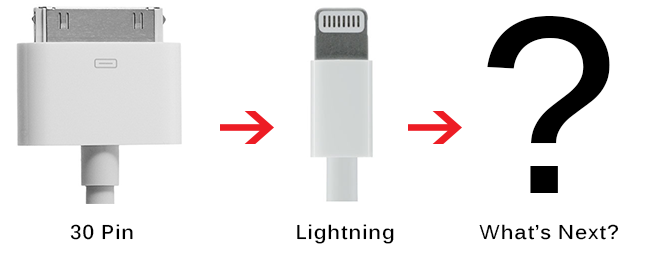Apple, Digital Music Connections and the Future
Until now all Apple iDevices utilizing the Lightning connector to USB A performed in USB Device Mode Audio. In this connection type the DAC works as a USB Host and the iOS device works as a USB slave. Apple calls this mode 'USB Device Mode Audio'.
USB Device Mode Audio

USB Device Mode supports Full Speed (12Mbps), 16bit/32,44.1 and 48kHz PCM audio. A DAC can send a USB Switch request like a USB On The Go command. Such a request could switch the iOS device from slave to USB Host.
This switching problem is similar to what happens with Android's OTG cable. After negotiation USB Role Switching confuses which devices should be in control. After this USB Role Switching, ONKYO HF Player App, for example, can recognize and send 24/192kHz PCM or DSD(DoP) data thus correcting the host vs slave switching problem.
Apple's Future Connection Challenges
Apple changes connections on their devices often. Their move from the 30pin Dock connection to Apple Lightning connection on their 5th generation of iDevices created a host of backward compatibility issues.
Evolution of Apple Connectors

Apple's MFi team is putting USB Role Switching into maintenance and may not support role switching with future iOS versions. We will check iPhone 6s and iPhone 6s Plus to see if role switching has been eliminated.
If Apple drops role switching in future iOS updates devices such as the Oppo HA-2 DAC currently able to connect 24/192 and DSD via the ONKYO HF Player App may not be able to connect with future iOS updates if role switching isn't included in future iOS upgrades.
Apple is moving to USB Host Mode Audio protocol
Apple's new protocol uses Lightning to USB Mini B or Micro B connectors. Connection choices and why products go through MFI certification is to make sure all products in the chain work with each other.
MFI Certified

MFI certified USB DACs with USB A will not work with a USB Host Mode Audio protocol cable. Adapters to convert to USB A will not work. This is why the Oppo HA-2 will not work with a USB Host Mode Audio protocol cable and an adapter.
We pitched Apple to let us do a MFI certified USB Device Mode Audio protocol cable with USB mini B so there would be a cable for the Cypher Labs newer products. The only way to get a cable through certification was to use a Mini A connector.
Has anyone seen a USB mini A connector readily available?
We have not and we could not find a Mini A connector source anywhere.
New cable development expense for just a few devices proved cost prohibitive. Future DACs will need to adhere to USB Host Mode Audio protocol or higher resolution audio may fade into the background. DACs should be able to do as they did in the past, 16bit/32,44.1 and 48kHz PCM audio.
We can't confirm much at present. Knowing how Apple loves to mix it up change is the only sure thing. Only time will tell.
Devices using USB Host Mode Audio protocol
The RAL-KEB03 and the Microshar G3 are the only two using the host mode protocol. Both work as a USB Audio Class 2 Device after starting up. We have the Prototype Ral here and are helping them fine tune the steps in the digitally controlled volume pot.
RAL & Apple USB Host Mode

The neat thing about USB Host Mode Audio protocol is that you can now use both the volume control on the portable Amp/Dac and the Apple iDevice to control the volume. This can make things easier when the phone is strapped to an Amp/Dac for on the go listening to provide easier control from the phone.
With newer headphones that come with Apple controls on the cable, you will be able to control the volume from the Headphone cable. This cannot be done with USB Device Mode Audio protocol.
Lightning Host mode cables enable iOS Lightning port
The lightning port is able to become a USB host port & acts the same as MacOS X USB Host ports.
Apple Lightning Port

Apple recommends that USB Host Mode Audio and unified iOS USB Audio Drivers for MacOS X USB Audio have implementation of iAP2 protocol compulsory with an MFi Logo Test that started in January 2015. Hopefully this is not too confusing, as I merely scratched the surface on these 2 formats.
We hope this information enables you to make the right choice in what connection types you need. The confusion I feel is only going to worsen with more formats in the future and I don't foresee any sort of industry standard either.
